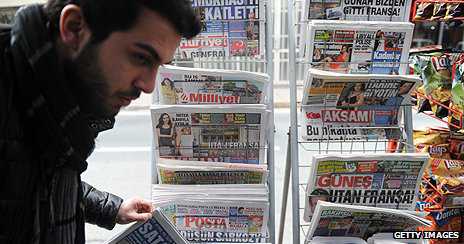
The military, Kurds and political Islam are sensitive topics for journalists
Turkey’s airwaves are lively, with some 300 private TV stations – more than a dozen of them with national coverage – and more than 1,000 private radio stations competing with the state broadcaster, TRT. Television is by far the most influential news medium.
Powerful businesses operate many of the press and broadcasting outlets; they include the Dogan group, the leading media conglomerate.
For journalists, the military, Kurds and political Islam are highly-sensitive topics, coverage of which can lead to arrest and prosecution. Rights groups say journalists have been imprisoned, or attacked by police. It is also common for radio and TV stations to have their broadcasts suspended for airing sensitive material.
Some of the most repressive sanctions have been lifted as part of reforms intended to pave the way for EU entry. But under Article 301 of the penal code, it remains a crime to insult the Turkish nation.
TRT has introduced broadcasts in Kurdish, banned for many years, under reforms intended to meet EU criteria on minorities. Kurdish-language TRT 6 TV launched in 2009. Some overseas-based Kurdish TVs broadcast via satellite.
Istanbul is the media capital, hosting the main press outlets. The city is home to some 40 major dailies with nationwide reach and 30 provincial publications.
Around 35 million Turks were online by June 2010 (Internetworldstats). Websites are subject to blocking. These have included YouTube, which was banned over videos deemed to be insulting to the founder of modern Turkey, Kemal Ataturk. However, circumvention techniques and technologies are widely used. Facebook attracts more than 22 million users.
via BBC News – Turkey profile – Media.

Leave a Reply